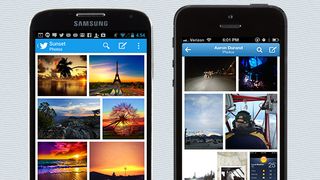What's the point of Twitter if it's just like Facebook?
Twitter's becoming Twitbook. Or is it Facwit?

At the end of Animal Farm - spoiler alert if you've been asleep since the 1940s - the creatures looked from pig to man, and from man to pig, and from pig to man again, but already it was impossible to say which was which.
Anyone else imagining Twitter and Facebook?
No?
Bear with me on this one.
In its ongoing quest to be a lot less Twitter and a lot more Facebook, a plan that will probably end up with Twitter calling itself BookFace and upsetting the internet by ruining a VR firm, Twitter is considering renaming retweets as Shares.
Apparently the problem is that the concept of retweets is too difficult for some people to get their heads around - and what Twitter really needs right now is more of those people, the kind of folk who still point at planes.
You can see where this is heading. Twitter now has photo tagging and multiple photo uploads, and it's considering dumping the @ symbol in replies. Twitter has also been testing what looks awfully like a Facebook interface, so it's just a matter of time before your Twitter feed fills with baby photos and racism.
Get daily insight, inspiration and deals in your inbox
Get the hottest deals available in your inbox plus news, reviews, opinion, analysis and more from the TechRadar team.
The inspiration runs both ways, of course. Facebook has yet to meet a good idea it didn't want to buy or copy. Soon we'll look from Facebook to Twitter, and from Twitter to Facebook, and it'll be impossible to say which is which.
Does this high-tech homogeneity matter? I think it does, to Twitter's detriment.
Bring on the botox
As social networks go, Twitter's learning curve is steeper than most: I'm sure many people checked it out, couldn't make head nor tail of the @this and the RT-that, and wandered off again.
But what Twitter's up to here isn't just about addressing the learning curve, it's about monetisation.
Twitter wants to get more users of the ad-clicky variety and it wants them to do more on the service so it can have more money.
The problem with that kind of strategy is that it dilutes the service's special sauce. For me, the big appeal of Twitter is its speed and simplicity, the lack of cruft and clutter, the sheer unFacebookness of it. The more Facebook-y it becomes, the less special it is.
This isn't new, of course, and it isn't just a tech thing. It's your favourite underground act moving up to stadiums, sacrificing the quirks and nuances and sharp edges that made you fall in love with them in the first place. It's your favourite down-to-earth actor moving to LA and becoming just another botoxed automaton. It's your favourite TV show jumping the shark.
It's what happens when you get big money and the big expectations that go with it.
It's understandable - investors don't just want success, they demand growth - but it's dangerous too. If you sacrifice your core audience and go chasing the mass market, then if that market moves elsewhere you have nothing to fall back on - and if all you have to offer the mass market is a me-too version of a bigger, more paranoid and richer rival, then you could all too easily find yourself outgunned, outspent and outnumbered.
Twitter is a wonderful thing. It'd be a shame to see it end up scrabbling for Facebook's table scraps.
Writer, broadcaster, musician and kitchen gadget obsessive Carrie Marshall (Twitter) has been writing about tech since 1998, contributing sage advice and odd opinions to all kinds of magazines and websites as well as writing more than a dozen books. Her memoir, Carrie Kills A Man, is on sale now. She is the singer in Glaswegian rock band HAVR.

